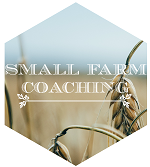Local food. It's all the rage these days and is becoming a key word in many circles. Grocery stores have begun tapping into this and posting how many miles their food is from the original source.
But what does the word "local" mean to you?
This question came to me as I spied today's newspaper and the Roth's ad had cantaloupe for sale that traveled 235 miles to get to the store. Is that local enough for you? What determines the line in the sand for you? For me, I think anything within 100 miles or less is local enough, but I'm still forming that opinion.
I think the word "local" is also getting just as warped as the word "organic". That big 'O' word means a lot to many people, but nowadays it's mostly just corrupted nothingness. The Big Ag and the government have twisted it and wrung it so much that it has all the meaning of an empty candy bag for the most part. Mind you, there are still *some* places that are still honest, and I whole-heartedly support small farmers who use organic practices (I try my best, myself), but am I the only one who sees the irony when you walk into an organic grocery store and see "organic" sodas and the organic equivalent of a Twinkie? Folks, we're mixing "organic" with "healthy" here. Oh, it's organic, therefore this soda MUST be healthy for me! Gone is the guilt as I glug this beverage that has organic high fructose corn syrup! Yippee!
Okay whatever... I have totally strayed from my topic.
Local food... Now think for a minute: When you saw that little picture next to the cantaloupe that says, "BUY LOCAL!" and "235 MILES FRESH!" did it give you a moment's (or more) feeling that this was a healthier choice than cantaloupe that came from a farther distance? Did it? C'mon, you have to be honest here. I'l 'fess, and say that yes, my first reaction was 'Oh, this is the healthier option, then!" And then the second thought was, "Or is it?" Just because they're telling the distance, doesn't mean that there's integrity behind the product.
What got that thought process going though, was seeing the "fresh, natural" chicken two ads to the right, saying that it was even better since it's only 43 miles from its original starting point. Shucks, I've probably seen that factory farm where that chicken came from, and let me tell you, if it's anything like all the other poultry houses in this country, then distance ain't gonna' redeem it. But the chicken ad really made me think... Grocery stores are tapping into the whole "local" thing and it's hurting the small farmers. It's still the same, poor quality food (if I may be so bold as to call it "food") sitting on those metal shelves, but suddenly it's given the image that it's this grand and healthy thing since it's local! Ouch! Meanwhile, the small farmers are using the term correctly but few people want their wares since they believe they can get the same quality and "localness" for much cheaper at the store. When I think of the term "local" the thought of integrity, honesty, and a human face comes to mind. When I hear of "local" food, my mind wants to KNOW the farmer behind the food. To know their practices, their farm, their land. To know that they stand behind their food 100% and are proud of it. Their food is local in the purest form. It is local, it is clean, it is healthy, it is FOOD. Know your farmer, know that he's near and local.
So, what does Local mean to YOU?









4 comments:
Good thoughts, Caitlyn, and something I've been trying to sort out myself... I've been drafting a blog post along those lines for a few days now. Local, seasonal, organic... which takes priority? Is it better to buy organically grown carrots from that came from CA which is on the opposite coast, or local ones that have been grown under questionable/conventional conditions?
Our farmers market defines local as "within a 50 mile radius" and say that, or no more than your 100 miles, seems reasonable.
I agree, there's BIG difference between healthy and organic. Local varies for me- I try to support local farmers, but it can be a matter of finding them. Sometimes they're in over-priced markets that sell more crafts than food, or they're so far away (1/2 hour drive or more each way) is it really useful to go there? I went to a farmers market coming back from a 2 day trip and I wanted to buy strawberries. I bought some last year and they were amazing! This year- none. Wiped out by hail, so I bought onions and corn. Oh well, if I want strawberries I can get some at the grocery store brought over from Oregon to Boise. With the weather this year, that's local.
I agree. "Local" is getting as complicated as "organic". And you're right to point out that we connect both of these words with "healthy", when in fact, they are not at all necessarily synonymous. For me, local should imply freshness, fossil fuel burned to get this food to me, dollars staying in my community, local people getting decent employment. I go for local first, actually, over organic. Like every locavore I know, I make a lot of exceptions - I get citrus fruit from California (I try to go by the season with this), coffee which is grown in Bolivia, but is at least locally roasted and ground, salt, sugar, olive oil. I totally agree that people are getting sucked in by the supermarket pricing on "local" stuff, but around here, it's not small farmers providing that produce - it's guys with a couple hundred acres in various crops - it has to be, because the stores want consistent volume, similar stock at all outlets, etc. The farmer goes with the low price because he gets it guaranteed - he negotiates for that a year ahead of time, so he can iterally "bank" on it. The smaller farmers locally are selling direct, through their own farm shops and stands, through markets, CSA's and a couple of small independent produces stores. And in those places, the prices are more realistic, ie expensive.
50 miles or less is what local means to me. It doesn't have to be certified organinc, because we personally believe that whole process is a crock (my husband is a feildman and lets just say what is considered organic is depressing!) Know the farmer and learn their process.
Post a Comment